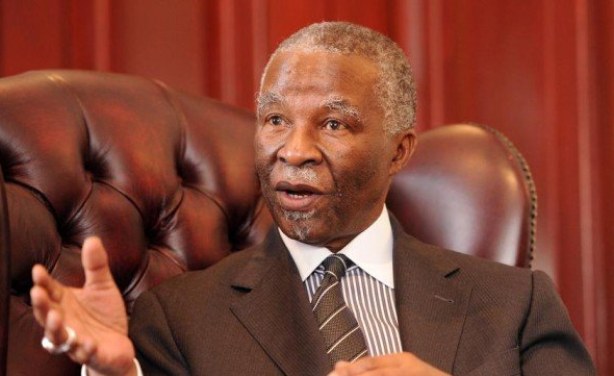As part of efforts to bring lasting solution to recurring xenophobic attacks on Nigerians in South Africa, a delegation from the House of Representatives has met a former president of South Africa, Thabo Mbeki.
The delegation led by the House Leader, Femi Gbajabiamila, was received by Mr. Mbeki at his residence in Johannesburg.
The meeting, which was held behind closed-doors, lasted for two hours with both sides addressing the media afterward.
“I had a meeting with the delegation of members of parliament from Nigeria and that is very pleasing indeed when I heard the news that delegation was coming,” Mr. Mbeki said. “It was important that they should come to interact with all these layers of South African society to address these particular matter , which have been raised that what are the South Africans doing killing and beating up other Africans.”
“I am happy to hear that they had interactions with parliament (South Africa’s) and know that we are a civil society I also hope that they will interact with the government so that we can cripple this matter to end it,” he added.
Mr. Gbajabiamila also spoke about the adoption of legislative diplomacy by both parliaments.
“As you are aware, we felt it was time that the parliament got in touch as you are aware we have been playing a less than proactive role in foreign relations over the years as parliamentarians so we just thought we should try something different in terms of a diplomatic approach,” he said. “We adopted what is known, around the world, as legislative or parliamentary diplomacy, by engaging the South African parliament, engaging the stakeholders.”
“We just engaged with the former president Thabo Mbeki, whose voice is still very loud here. In addition, we decided to do some kind of fact finding to see what can be done to arrest the situation and a reoccurrence of it,” Mr. Gbajabiamila added.
The House of Representatives delegation which consist of the Foreign Affairs Committee Chairman, Nnena Ukeje-Elendu; her counterpart of Special Duties, Nasir Zangon-Daura; Deputy Chairman Committee on Diaspora, Shehu Musa; Sadiq Ibrahim, and Henry Nwawuba as members.
The delegation had earlier met with members of South African parliament, and the Nigeria-South African business community and Nigerians living in South Africa on Saturday.
Nigeria, South Africa set up early warning unit
The Minister of Foreign Affairs, Geoffrey Onyema, said on Monday that Nigeria and South Africa have agreed to set up an early warning unit to check future xenophobic attacks.
Mr. Onyema, who is leading a Federal Government delegation to that country, disclosed this to the News Agency of Nigeria on telephone from Pretoria, South Africa.
The minister said the early warning unit would comprise representatives of the South African Ministry of Foreign Affairs, Home Affairs, police, immigration, representatives of Nigerian High Commission, consulate, and the Nigeria union in South Africa.
“They will meet every three months and that will be a framework within which the Nigeria Union in South Africa will be able to engage on a permanent basis with the main high-level government officials of this country.
“We believe that it will enable them in sharing intelligence, information and being proactive to prevent this kind of thing ever happening again,” he said.
Mr. Onyema said the delegation had positive discussions with the South African Foreign Affairs Ministry and Home Affairs Ministry on how to protect Nigerians and their property.
He said the meeting agreed to set up the early warning unit to dialogue quarterly to prevent such incident.
The President of Nigeria Union, Ikechukwu Anyene, said Nigerians in South Africa appreciated the delegation’s visit.
“The spirit of our people here has been lifted. The mood has changed and our people are happy,” he said.
Mr. Anyene said the early warning unit set up by the two governments was a positive development because the union would be in a position to interact with top government officials regularly.
“On our part, we will advance social cohesion between Nigerians and South Africans,” he said.
The delegation visited business premises and homes of Nigerians attacked during the xenophobic incidents in February.
(NAN)

